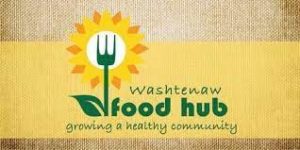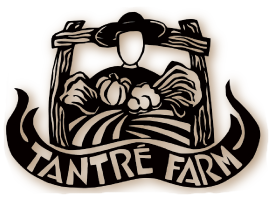
What We Do
The Washtenaw Food Hub (WFH) is a limited liability corporation, formed in 2011 to promote economic development, employment and accessibility around local food. In short, the Washtenaw Food Hub will be a single point of contact for local food purchasing, processing, aggregation, storage and distribution.
Main goals are:
- Develop a working community of triple bottom line farm and food businesses to strengthen individual, economic and environmental health.
- Increase existing farm income and generate new income channels for area farmers and value-added food producers.
- Provide year-round availability of local food to individuals, chefs and institutional buyers.
- Stimulate the creation of jobs.
- Develop educational programs and demonstration projects that offer community participation and show the connection between food, place and health.
We have renovated existing buildings to create professionally managed facilities, including commercially licensed processing kitchens and other agricultural infrastructure such as: retail and wholesale sales, a farm market, educational programs, heirloom bulb gardens, and ecological demonstration projects.
Various factors support the timeliness and economic sustainability of the Washtenaw Food Hub, including rising fuel prices, increased consumer demand for local food, and community and institutional initiatives supporting local, sustainable food production. Ann Arbor Township, for example, has preserved more than 3,200 acres of open space and farmland through its Small Farm Initiative, contributing to the development of the “Ann Arbor Greenbelt“. In 2010, a small farm incubator, Tilian Farm Development Center, was established in the Ann Arbor Charter Township for the purpose of populating preserved agricultural land with small farm enterprises. In addition, the University of Michigan committed to purchasing 20% of their food from local, sustainable sources by 2020, and Washtenaw County created a Food Policy Council to “support small and mid-sized farmers by fostering policies that encourage local food purchasing and production.”
Early activities at the Washtenaw Food Hub site have included restoration of the buildings and grounds, Food Hub open houses, and events for local community organizations, including the Ecology Center’s EcoRide and a People’s Food Coop event featuring Joel Salatin. In early 2014 we opened three commercial processing kitchens, two of which are available for hourly or longer term leasing, and the third, which is occupied full time by the Brinery. Current primary kitchen business operations at the Washtenaw Food Hub site include headquarters for the Brinery (a local foods business, specializing in naturally fermented local vegetables), Ginger Deli (featuring Vietnamese cuisine distributed in their deli on Liberty St.), Harvest Kitchen (a prepared food CSA dedicated to sourcing local, organic products as much as possible), Raterman Bread (baking sourdough bread made from local ingredients), and other value-added producers sourcing local ingredients.
